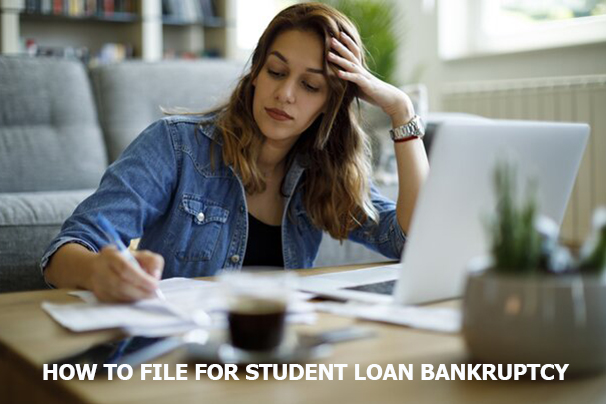Before considering how to file for student loan bankruptcy, you should think about various options like deferment, income-driven payment, and forbearance. Filing student loans in bankruptcy can be very challenging compared to other unsecured debts.
Furthermore, obtaining student loans in bankruptcy involves an additional step of filing an adversary proceeding. Also, the IRS might withhold your tax refund and send it to your federal loans only if the loans are in default.

However, when filing for bankruptcy for a student loan, you should request to file for Chapter 7 or Chapter 13 bankruptcy. Additionally, request an adversary proceeding (AP) to evaluate your student loans for possible discharge.
How to File for Student Loan Bankruptcy
It’s important to note that filing either Chapter 7 or Chapter 13 bankruptcy involves the careful completion of large paperwork. And also revealing your assets, income, debts, and expenses. Additionally, court bankruptcy will appoint a worthy trustee with your creditor to verify your debts as you engage in credit counseling as a requirement.
Search for a Bankruptcy Attorney
Working with an attorney isn’t mandatory; getting one knowledgeable in student loans can assist your ability to navigate the challenging process of bankruptcy more efficiently. The cost of filing for bankruptcy varies, ranging from several hundred to several thousand dollars, depending on your location and the complexity of your case.
Additionally, there are attorney fees associated with an adversary proceeding to discharge student loans. It’s essential to note that eligibility for a student loan bankruptcy discharge is doubtful if you have the financial means to afford legal representation.
File for Either Chapter 7 or 13 Bankruptcy
For the discharge of your student loans, the first step is to file for bankruptcy. Your attorney can assist in assessing the most suitable consumer bankruptcy type for your situation. Whether it’s Chapter 7 or Chapter 13.
In cases where bankruptcy has been filed without pursuing the discharge of student loans, it is possible to reopen the case and advocate for it to be cleared.
Get a Complaint to start the Adverse Proceeding
Initiating the discharge of student loans through bankruptcy involves an additional legal step called an adversary proceeding. To start this process, you or your bankruptcy attorney must file a written complaint detailing your situation. However, the case undergoes litigation until the judge reaches a decision. The possible outcomes include full discharge, partial discharge, or no discharge of the student loans.
How Does it Work?
You can secure student loan discharge in most situations, but the procedures are very challenging compared to dealing with other debts. Moreover, filing for bankruptcy does not determine whether a student loan will be granted.
However, you have to file for bankruptcy under either Chapter 7 or Chapter 13. Then, take an extra step by filing an adversary proceeding, which is like a lawsuit linked to a bankruptcy case in the same court.
Furthermore, delaying payments can seriously harm your financial situation by reducing your credit score. If you’re thinking about missing payments and going for student loan bankruptcy, carefully consider the advantages and disadvantages.
Factors To Consider While Filing for Student Loan Bankruptcy
Before considering how to file a student loan bankruptcy, there are a few things to keep in mind and consider carefully:
You might Need to Pay an Extra
The court for bankruptcy will determine the monthly payment for each creditor. If there are debts with higher importance than student loans, there’s a chance of gathering more interest on those student loans.
No Other Debts Mean Less Chance
If you only have your student loan without any other debts, it is unlikely for you to successfully argue for the discharge of your student loan.
Loan Differences Matter
Discharging or settling a private student loan in bankruptcy stands a better chance compared to a federal student loan. This is because federal student loans provide income-driven repayment plans, unlike private student loans.
Private loans that pay beyond qualified higher education expenses, like living costs, could be entirely discharged in bankruptcy court.
Filing Fees
Filing fees are a must unless the court decides to waive them. If you have a lawyer, the court might think your situation isn’t urgent enough for a student loan discharge.
In addition, look into finding an attorney who could handle your case for free or at a minimal cost. Check out the American Bar Association or your state bar association’s website for lawyer options.
Can I Get out of Student Loans Through Bankruptcy?
It’s possible to get out of a student loan through bankruptcy, but it’s not certain. However, you need to file an adversary proceeding, submitting a standard filing that establishes the need and undue hardship.
If successful, you might get partial or full forgiveness, but your request could be denied, leaving you responsible for your current loans along with court fees. Furthermore, federal loans that explore relief through the SAVE plan are an option.
The application is quick, takes about 10 minutes, and can significantly slash your monthly payments, perhaps even down to $0. If you’re feeling concerned about bills, whether they’re student loans or other debts, you can consult your financial advisor to explore your options.
FAQs
Can I Get Rid of My Student Loans?
Yes, you can get rid of your student loan, which has various methods, but the simplest way to do that is by paying off your entire debt.
Can Student Loans be Discharged After 10 years?
Yes, student loans can be discharged after 10 years, but most of the time, the duration of payment differs.
Conclusion
If repaying your private student loans becomes a challenge, there might be a chance to get them discharged. However, you and your bankruptcy attorney may encounter a challenging legal fight to achieve this, as the courts haven’t reached a clear decision on the discharge of private student loans through bankruptcy.
